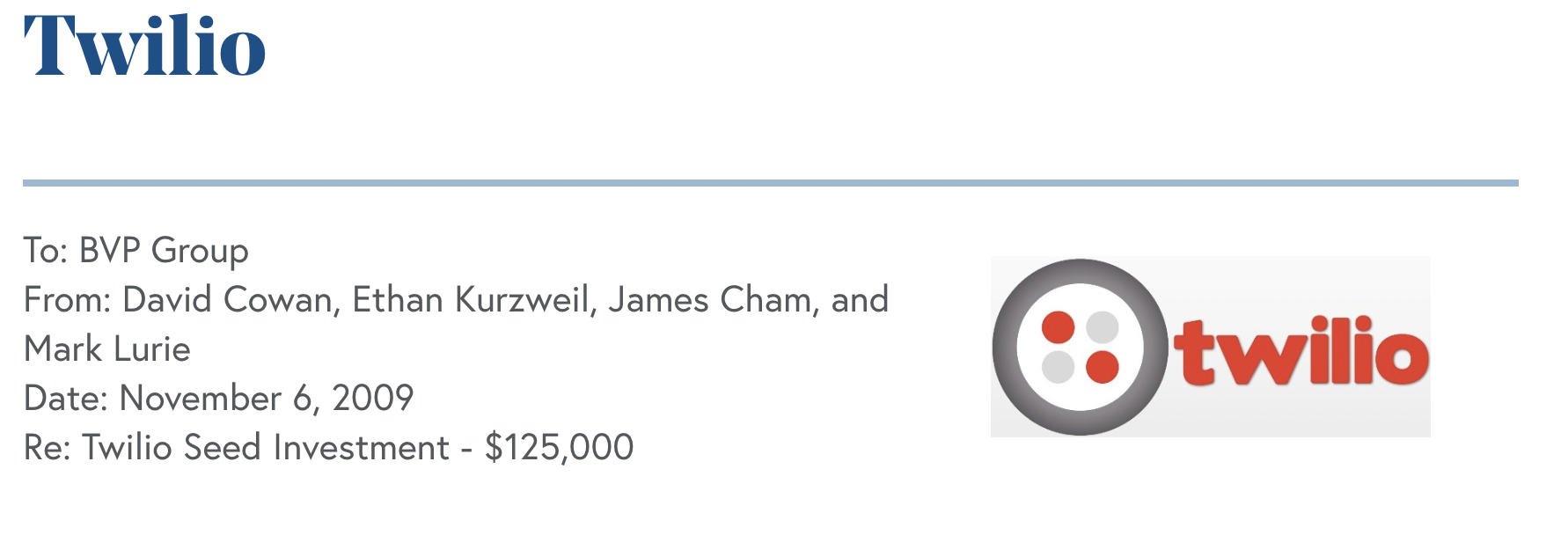Inside the Deal: Twilio's Early Investors
Welcome to our new weekly series - Inside the Deal - where we dive deep into the early investors of iconic companies.
Since we covered the Twilio Mafia this week, we dug up some data on the first investors who decided to take a bet on Twilio.
Founded in 2008 by Jeff Lawson, Evan Cooke, and John Wolthuis, Twilio is a cloud communications platform that helps integrate various communication channels, such as SMS, voice, email, and video, into their applications and services.
Quick stats:
Valuation at IPO: $1.2 billion
Money Raised at IPO: $150 million
IPO Share Price: $15
Twilio's first VC investor
Bessemer Venture Partners was one of the early investors in Twilio. Bessemer is one of the oldest and most reputable venture capital firms in the United States. This is the official investment memo they shared on their website.

Founded in 1911, Bessemer has a long history of investing in and supporting innovative technology startups. The firm has been involved in funding some of the world's most successful companies, including LinkedIn, Pinterest, Yelp, and Shopify, among others.
Other investors who took an early bet on Twilio
Mitch Kapor
Mitch Kapor, the American angel investor known for his involvement in the technology industry, was one of the early individual investors in Twilio. He invested $250,000 in Twilio during its early stages.
Dave McClure
Dave McClure, the founder of 500 Startups, invested $50,000 in Twilio in its early days.
Techstars
In 2009, Techstars invested in the seed round as well as Series A of Twilio and it has been one of the biggest exits for them.
Founders Fund
Founders Fund, founded by Peter Thiel, was one of the early investors in Twilio. They participated in Twilio's Series A funding round in November 2009, investing $1 million.
Union Square Ventures
Union Square Ventures joined Twilio's Series A round in November 2009, alongside Founders Fund. They also invested $1 million in the company.

Why investors thought it is a great deal
When Techstars and Bessemer Ventures laid their eyes on Twilio, they saw a game-changing product that simplified the complex world of voice applications. Here's what stood out and compelled them to invest:
1. Developer-Friendly Platform
Twilio was designed with web developers in mind. Unlike traditional telecom systems that required specialized training, Twilio's offering allowed any web developer to dive in without hesitation.
2. No Telecom Hassles
Twilio removed the headache of dealing with telecom companies or specialized integration service providers. Developers could sign up for an account, select a phone number, and get started without the red tape that typically accompanied telecommunications projects.
3. Simple Building Blocks
Twilio introduced five core verbs that formed the foundation of their platform, akin to XML. These verbs empowered developers to create common voice features effortlessly.
4. Rapid Innovation
Twilio impressed investors with its ability to swiftly roll out new features based on feedback from the developer community.
5. Maintaining Simplicity
Despite adding more complex features, Twilio stayed true to its core building blocks, ensuring that its markup language remained simple and intuitive.

Why Bessemer invested early in Twilio
The "Eight Laws for Developer Platforms" are a set of principles and criteria that Bessemer Ventures uses to evaluate and invest in startups in the developer platform space. When it comes to Twilio, Bessemer Ventures found that Twilio not only met but exemplified these eight laws, making it a standout investment opportunity.
Law 1: Delivered a service that can be metered
Law 2: Grows with the business
Law 3: Replaced something that companies already paid for
Law 4: Offered an amazing user experience for the developer
Law 5: Received tons of explicit developer love
Law 6: Exhibits strong network effects
Law 7: Eliminated the need for non-core skill sets that no one enjoys
Law 8: Democratized development
Other things that stood out to Bessemer Partners were:
Web Developer Community:
The company targeted the web development community, aiming to inspire developers to create innovative voice applications using their platform.
Rebuilding Existing Applications:
Twilio's approach also enticed businesses with existing voice applications. Many faced challenges when changes were needed, as the original developers were often long gone.
Contests, Promotions, and Social Marketing:
Twilio's initial sales and marketing efforts centered around generating viral buzz and word-of-mouth referrals within the web development community.
High-Profile Clients:
Twilio's success extended beyond web developers. Notably, they secured clients such as Google, Best Buy, Deutsche Bank, and Mobile Commons.
Join our waitlist
Love what we do?
Give us a follow on:
Twitter


